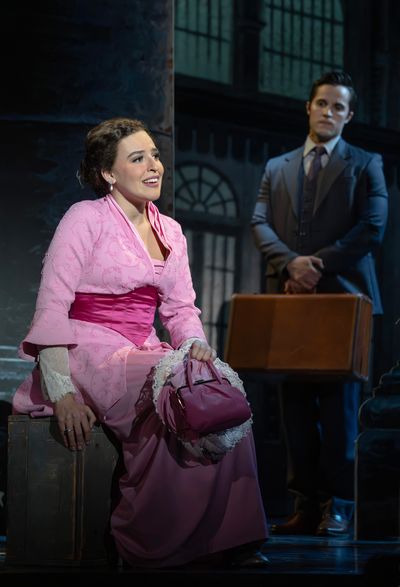Young, bright star of ‘My Fair Lady’ talks on iconic role of Eliza Doolittle

The Spokesman-Review had an opportunity to chat with Anette Barrios-Torres, the 23-year-old star of “My Fair Lady,” which runs from Tuesday through April 7 at the First Interstate Center for the Arts. Below are excerpts from the interview with the Miami native, who landed the iconic role of Eliza Doolittle just two weeks after graduating from Oklahoma City University last spring.
Q: What do you like about playing Eliza Doolittle, the Cockney flowergirl who gets plucked from the London streets to be trained to sound like a high-society lady by linguistics professor Henry Higgins?
A: I love Eliza so much. I think she’s my favorite character I’ve ever played, which is probably silly to say at 23, but I stand by it! I grew up being fascinated with her and really looking up to her. I used to watch “My Fair Lady” on repeat, like what “Wicked” was to a lot of people, “My Fair Lady” was to me. Eliza feels like an old friend that maybe some people have misunderstood in the past. And I’m getting to sort of rectify her journey as we go.
Q: How has Eliza been misunderstood?
What I have always loved about Eliza is that she doesn’t actually ever change who she is. Her transformation is all about changing behavior and knowing when to speak and how to say something. So, instead of lunging at people to get what she wants, she learns how to cut with her words now, and people want to listen. By the end she’s become so proficient that she beats Higgins at his own game, in my opinion, and I do love that.
Q: What is Eliza’s biggest challenge?
Eliza’s problem seems to be that she doesn’t know where she belongs and she’s trying to find a home. She knows she doesn’t belong where she started and she’s trying to move up, but she doesn’t feel comfortable all the way at the top either. And so, trying to find the place that feels like she should be there and where she’s accepted is a challenge for her.
I come from immigrants … We’re all Cuban … One perspective that has been really fascinating to me is just learning how many people have come to this country and learned to mask their own dialect so that they could be accepted so that people would listen to them and so that they could fit in. But how immigrants speak doesn’t change who they are or where they came from.
Q: I’ve read you are a major bookworm and lover of old movies. What fascinated you about this musical and play as a child?
George Bernard Shaw, (who in 1913 wrote “Pygmalion,” on which “My Fair Lady” is based), was a feminist and had a lot of interesting social ideas about the way the world should work. After my grandmother bought me a copy of the book in second grade, I used to collect different editions of the play. I think I was really fascinated by this idea of transformation and perception and how something so seemingly external could change.
Q: How do you show Eliza’s transformation?
I think the most helpful thing for me is to get really into my body. Finding Eliza’s walk and the rough way in which she sort of moves around the world at the very beginning. That is what makes the walk out when she’s wearing the ball gown and Colonel Pickering says, “Miss Doolittle, you look beautiful,” and she looks like she’s literally gliding. I take just seamless little steps because I want the audience to be like, “Is that the person we saw at the beginning of the show?” Because it has to be that drastic or she really isn’t going to fool anyone.
Once Eliza’s sort of settled into what that feels like to move through the world this way, she honestly can’t go back fully. She knows how to flip-flop between the dialects now. But I think physically she’s learned that she likes going about the world in this manner. People listen to her.
A lot of more people have been listening to Barrios-Torres now, too. She had just finished earning her music degree at OCU last May when the conductor with whom she had worked on other shows at the Lyric Theater in Oklahoma City contacted her to request that she audition for “My Fair Lady,” the show he would be conducting on the road.
“He saw something in me that he felt, I guess was, was worth messing with because the first day I went home and I was like, I’m gonna get fired. He doesn’t like me,” Barrios-Torres recalled. “Two and a half weeks later and he was like, ‘I knew what you had in you and I needed it to happen.’ “
Plucked from a smaller world to the big time. Sounds like a familiar story worth watching. Tickets are available at www.firstinterstatecenter.org.